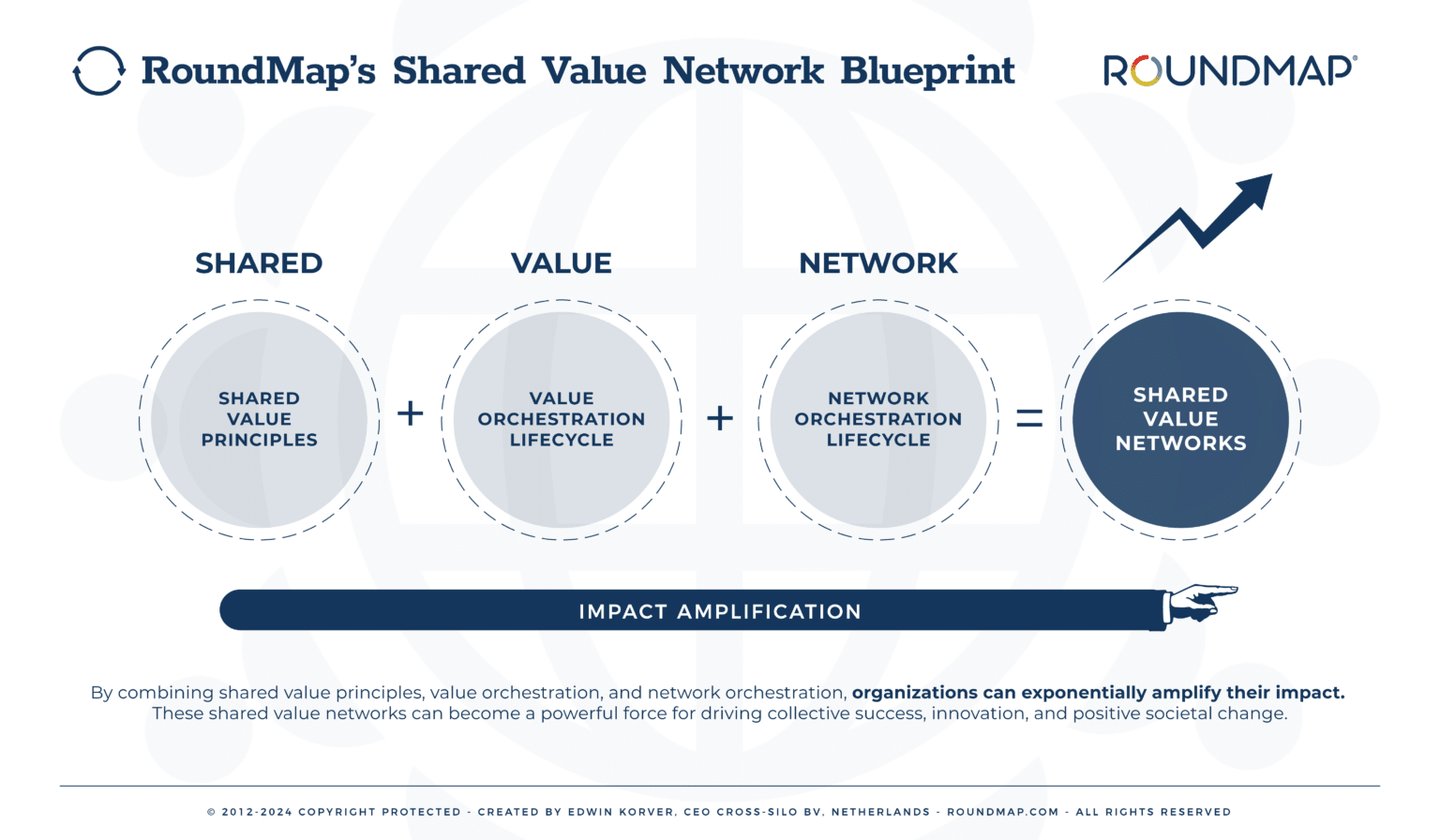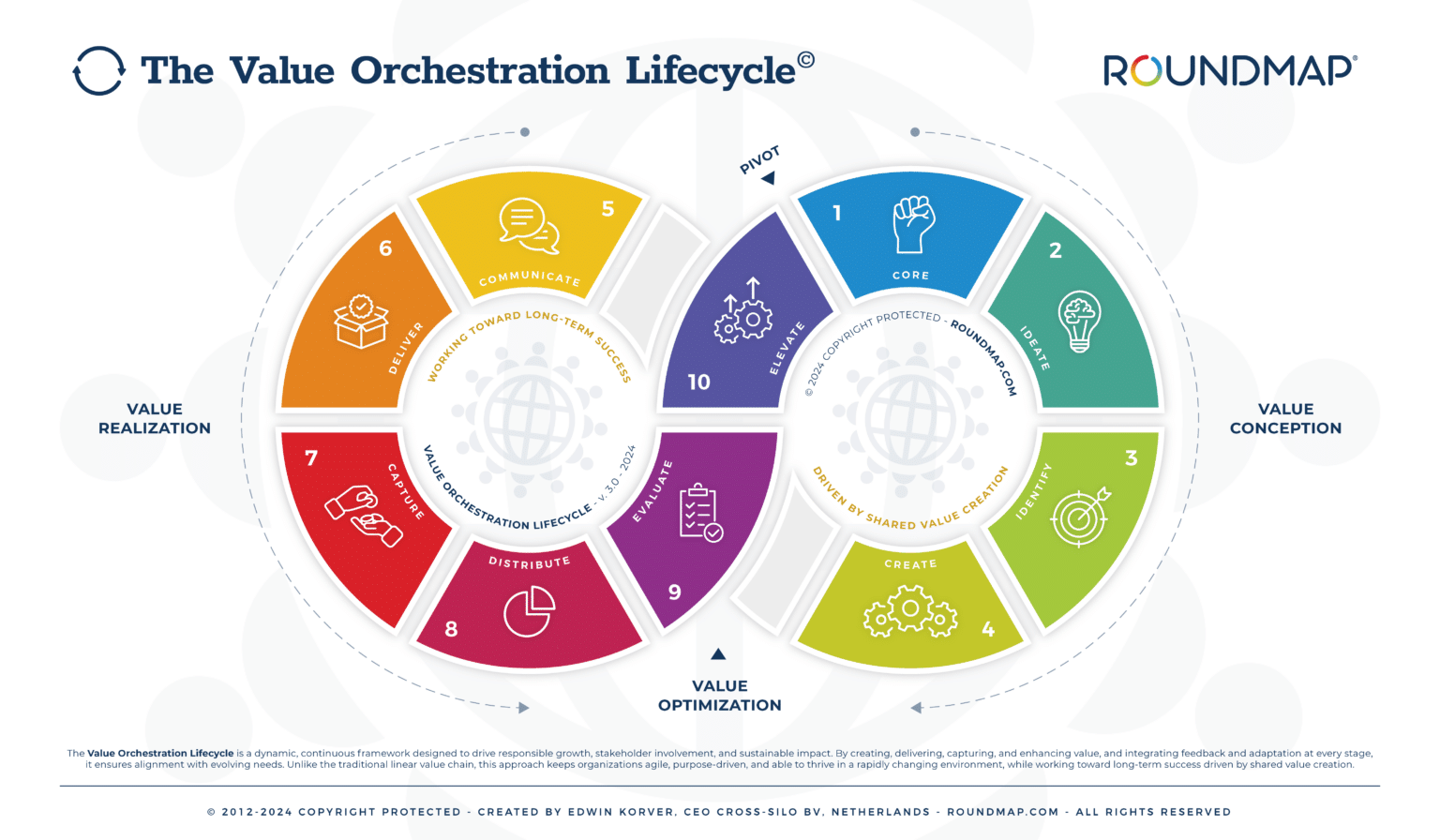Building long-term, sustainable growth requires more than just orchestrating value or networks. While the Value Orchestration Lifecycle ensures the creation and adaptation of value, and the Network Orchestration Lifecycle focuses on building and organizing networks of stakeholders, these elements alone are not enough to drive lasting impact. These lifecycles risk focusing on short-term profits or isolated customer satisfaction without a guiding principle.
The missing piece is the principle of generating shared value, a mindset that seeks to amplify positive impact and mitigate adverse effects for all stakeholders. When value orchestration, network orchestration, and shared value work together, businesses can build Shared Value Networks—ecosystems that thrive on mutual benefit and drive equitable, sustainable growth.
1. The Value Orchestration Lifecycle
This lifecycle is focused on creating, delivering, and continuously enhancing value. However, without the principle of shared value, it could still operate with a short-term profit mindset. Shared value ensures that this lifecycle looks beyond profits toward long-term, positive impact.
2. The Network Orchestration Lifecycle
The network lifecycle involves organizing diverse stakeholders and forming connections. On its own, this could solely focus on customer value. However, the principle of shared value becomes a force for building inclusive networks that serve the needs of all stakeholders, fostering sustainable relationships.
A familiar example of Network Orchestration is the Customer Engagement Lifecycle. It represents a pivotal step in understanding and optimizing a business’s front-end operation. This lifecycle assesses every interaction between the company and its customers, serving as the foundation for RoundMap’s broader, unified framework.
3. The Principle of Shared Value
The glue that binds both orchestration lifecycles is the principle of shared value. This principle shifts the focus from isolated success to collective impact, amplifying positive outcomes while mitigating any negative consequences. They ensure that both value creation and networks serve not only the business but also society at large.
These are the principles of Shared Value:
Interdependence of Business and Society: Businesses do not operate in isolation; their success is deeply intertwined with the health and well-being of the communities and environments in which they operate. Shared Value recognizes this interdependence, aiming to address societal needs while driving business growth.
Value Creation for All Stakeholders: Shared Value emphasizes creating value not just for shareholders but for all stakeholders—customers, employees, suppliers, communities, and the environment. By aligning business goals with society’s broader interests, companies can achieve sustainable growth.
Integration of Social and Environmental Goals into Core Strategy: Rather than treating social and environmental concerns as separate from business operations, the Shared Value principle integrates these concerns into the core business strategy. This means addressing ecological sustainability, equitable labor practices, and community development as part of the company’s business model.
Innovation through Addressing Societal Challenges: Companies can unlock new opportunities for innovation by addressing societal challenges. This principle emphasizes that solving pressing social or environmental issues can lead to new markets, products, services, and business models contributing to societal progress and profitability.
Collaboration Across the Ecosystem: Shared Value encourages businesses to collaborate with various stakeholders, including governments, non-profits, and other companies. This collaborative approach helps to leverage collective strengths and resources, driving systemic change and creating broader societal impact.
Long-term Sustainable Success: Shared Value moves beyond short-term financial gains and focuses on long-term, sustainable success. By building solid relationships with stakeholders and addressing systemic societal issues, companies can create lasting positive impacts that strengthen the business and the communities they serve.
These principles guide businesses toward profitable and socially beneficial practices, fostering an ecosystem that supports equitable and sustainable growth.
The Culmination: Shared Value Networks
When these three elements align, the result is a robust Shared Value Network—a system where businesses, stakeholders, and communities grow together. This approach creates more than profit or customer satisfaction; it fosters a lasting, positive impact on all parties involved, enabling long-term, sustainable, and equitable growth.
Shared Value Networks are about more than just doing business—they are about creating a future where businesses, communities, and ecosystems thrive together. By orchestrating both value and networks, RoundMap provides a blueprint for organizations to achieve long-term success while contributing to the greater good.
Continue Reading:

Mapping the Future: We’re Writing the Book on RoundMap®
At RoundMap®, we believe the future of business lies in wholeness, not fragmentation. For too long, organizations have been shaped by linear thinking, short-term gains,

More Than Crumbs: The Case for True Value Creation
For decades, shareholder primacy has dictated corporate decision-making, driving businesses to prioritize short-term profits and disproportionate returns to shareholders over long-term sustainability and stakeholder value.

Beyond Extraction: Why Regenerative Business is the Only Way Forward
The RoundMap’s Regenerative Business Framework proposes a dual-cycle approach to business: one focused on value creation and another on impact. However, reality presents us with

RoundMap Regenerative Business Framework: Empowering the Present while Building the Future
Executive Summary The Regenerative Business Framework addresses the critical need for businesses to move beyond mere profitability toward regenerative practices that drive long-term growth and

The RoundMap Flywheel: A Shift Toward Sustainable Ecosystem Resilience
What if impact creation was as strategic and intentional as value creation? What if every dollar earned didn’t just fuel a business’s bottom line but

From Striving to Thriving: How Amazon is a Strive-Driven Giant Failing to Thrive
Amazon has become synonymous with business success, often hailed as a master of efficiency, customer obsession, and innovation. At the heart of its growth strategy

Impact Strategies to Amplify Value and Mitigate Harm Across Stakeholders
What if doing the right thing wasn’t just a moral choice but a strategic one? What if amplifying your organization’s positive impact while mitigating harm

From Extraction to Contribution: Thriving Together with Shared Success
The Flywheel of Shared Success is designed to demonstrate that staying within the boundaries of responsible growth doesn’t mean limiting our ambitions—it means channeling them

The Twin Engines of Progress: Returns on Value and Impact
At the heart of the Flywheel of Shared Success lies the powerful interplay between Value Returns and Impact Returns, both of which operate on the

From Hopping for Cash to Building Bridges: Why Self-Interest Alone Can’t Sustain Shared Prosperity
What we’re proposing with the Flywheel of Shared Success is nothing short of a call to confront and correct our deeply flawed execution of Adam

The Strive & Thrive Cycle: Distinquishing Between Value and Impact
Distinguishing between value creation and deployment (Strive-phase) and impact creation and deployment (Thrive-phase) is critical to clarifying their roles within the Strive & Thrive Cycle. Here’s

From Striving to Thriving: How Decathlon is Shaping a Sustainable Future in Sports Retail
In the ever-evolving world of sports retail, the line between short-term success and long-term impact is a delicate balancing act. For companies like Decathlon, the
Author
-
Edwin Korver is a polymath celebrated for his mastery of systems thinking and integral philosophy, particularly in intricate business transformations. His company, CROSS/SILO, embodies his unwavering belief in the interdependence of stakeholders and the pivotal role of value creation in fostering growth, complemented by the power of storytelling to convey that value. Edwin pioneered the RoundMap®, an all-encompassing business framework. He envisions a future where business harmonizes profit with compassion, common sense, and EQuitability, a vision he explores further in his forthcoming book, "Leading from the Whole."
View all posts Creator of RoundMap® | CEO, CROSS-SILO.COM





